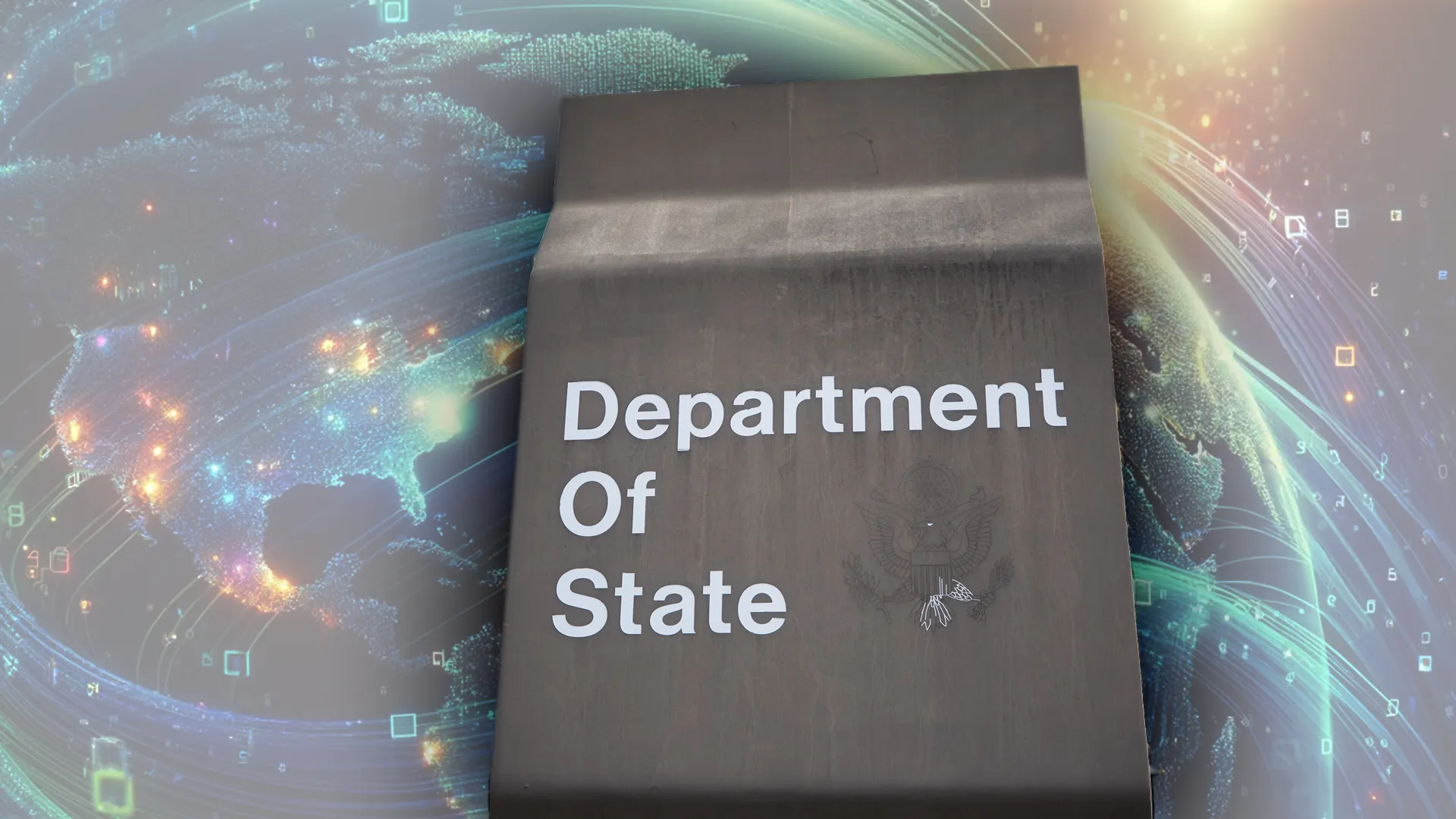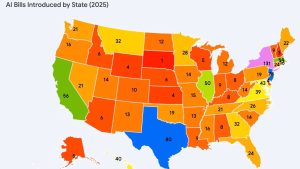
A new international digital policy strategy released by the State Department this week signaled a welcome return to the United States displaying an affirmative agenda for U.S. interests in the digital space. This State Department vision is essential to promote the open internet and to combat the rise of digital authoritarianism and digital sovereignty and warrants the support of U.S. trade policy, including in the development, negotiation, and enforcement of binding rules.
The pivot in question came in the State Department’s “International Cyberspace and Digital Policy Strategy” (“the State Department’s Strategy”), released on May 6 at the RSA Conference. In the document, the United States demonstrates a commitment to “continue international engagement to enhance interoperability, security, and market access” in the face of “an increasing willingness by some countries to embrace narratives of digital sovereignty and protectionism by blocking access to their markets, unduly preventing cross-border data flows, and preferencing domestic manufacturers and service providers.”
The State Department further expresses an interest in securing “digital solidarity,” which the Administration argues “seeks to develop shared mechanisms that will help maintain an open, interoperable, secure, and reliable Internet as well as trusted cross-border data flows” and “works to foster democratic values-based and rights-respecting policies.” To promote these democratic ideals in the digital space, the State Department argues that “the joint development, harmonization, and mutual recognition of rights-respecting approaches to data governance and digital trade” are needed.
The initiative acknowledges a key goal in promoting cross-border data flows and other positive digital trade outcomes—data flow rules are necessary to promote interconnected online commerce globally; protect all U.S. service providers abroad that rely on the fair flow of data to operate; support freedom of expression and global communication; and shield the open internet model for years to come.
The State Department’s vision in this document builds on an early initiative of the Biden Administration in foreign policy—the Declaration For the Future of the Internet (DFI). The United States actively promoted the Declaration with a view to “advance a positive vision for the Internet and digital technologies,” to “[reclaim] the promise of the Internet in the face of the global opportunities and challenges presented by the 21st century,” and to “[reaffirm and recommit] its partners to a single global Internet – one that is truly open and fosters competition, privacy, and respect for human rights.”
The Biden Administration explicitly promoted the vision of the DFI as a venue for countries to pursue a governance alternative to the China model of governance and to promote integration between like-minded partners. On a press call previewing the DFI, a senior administration official told reporters that the goal was to offer “a response to these kind of ‘splinternet’ tendencies [of China and Russia] by a number of the authoritarian countries around the world.”
The DFI initiative has largely been moribund the past two years, but the State Department’s recently-released Strategy expands on the legacy of that effort and greatly improves it by centering advocacy on specific barriers to digital services providers’ operations abroad. The State Department’s Strategy focuses on issues such as data localization and other measures that leverage “digital tools in ways that violate or abuse the individual’s right to be free from arbitrary or unlawful interference with one’s privacy, and restricting and threatening individuals’ rights to freedoms of expression, association and peaceful assembly.”
The Strategy hones its message promoting the U.S. vision of the open internet to focus on the importance of addressing “[a]uthoritarian and illiberal states [that] are seeking to restrict human rights online and offline through the misuse of the Internet and digital technologies” and raising the alarm over governments that are “closing and siloing the Internet: suppressing dissent through Internet and telecommunications shutdowns, virtual blackouts, restricted networks, and blocked websites.”
This proactive effort of the State Department to counter the proliferation of these restrictions to digital services is timely and essential—as the spread of China’s repressive model of digital oversight is well under way. Government-imposed internet shutdowns have remained prominent in recent years, with the total number of countries shutting down the internet having grown from 19 in 2017 to 35 in 2022, the largest annual number recorded by Access Now. Internet shutdowns gravely harm human rights and freedom of assembly and expression, while also hindering economic activity.
Other forms of digital authoritarianism cited by the State Department—such as data localization and blocking or throttling online services—are spreading as well. Often, censorship efforts are couched in strict oversight such as localization requirements, takedown demand regimes, and registration/licensing requirements.
Specific examples of the policies that the State Department’s approach seeks to address and prevent are plentiful. Nigeria and Indonesia have blocked websites in recent years as part of regulatory power grabs over user expression and content on online platforms. In the past, Turkey has banned services to restrict speech as well. Allowing this to become a regular tool used by countries splits the internet bit by bit, eventually threatening its utility as a global communication medium, platform for digital industries’ growth, and individuals’ connection to the world. Cambodia and Nepal are at various stages of implementing “National Internet Gateways” that filter the internet and create government-owned intranets. As the Internet Society explains: “National Internet gateways are typically tasked with interception or inspection of content so that targeted content can be acted on, for instance, by throttling, filtering, or blocking. This would centralize government control over questions of access and online content and create a threat of censorship and self-censorship for fear of government surveillance and potential repercussions… It would also risk restricting the free flow of information between Nepal and the rest of the world, furthering Internet fragmentation.”
Data localization laws, while presenting significant obstacles to U.S. operations abroad and undermining the global internet, are also leveraged by countries to administer vast surveillance and censorship regimes, such as Russia’s “Landing Law.” Similarly, Vietnam passed its own version of data localization requirements aligned with China’s approach. Another example is Pakistan’s “Removal and Blocking of Unlawful Online Content (Procedure, Oversight and Safeguards) Rules 2021,” which require online service providers to localize data and take down online content it deems necessary to protect broadly-defined values that include the “security of Pakistan,” “public order,” “decency and morality,” and the “integrity or defence of Pakistan.” Providers only have 48 hours to comply, under threat of the government either degrading the providers’ services, blocking the provider, or imposing a fine of up to 500 million rupees (about $2.24 million). Similarly, India imposes strictly brief deadlines for takedown demands of online service providers, which can effectively require digital services suppliers to localize data in order to comply and can chill free speech.
U.S. leadership in the digital space can combat the spread of similar efforts globally and particularly in the Indo-Pacific region, a key piece of U.S. diplomatic and security policy objectives.
Illustrating the impact and value of the State Department’s approach, in February, 12 civil society organizations and academics urged the Biden Administration that rules “opposing forced data localization, supporting the free flow of information, combatting mandatory transfers of intellectual property, and championing non-discrimination for information products” are all fundamental to the open internet that “[a]dvocates and governmental bodies have long championed… as key for fostering human rights and ensuring access to information globally.”
It’s Not Just Authoritarianism: State Department Focuses on Like-Minded Partners Pursuing ‘Digital Sovereignty’ Policies, Too
Of course, the spread of digital authoritarianism requires urgent reaction from the U.S. government, but the State Department Strategy astutely notes the problematic nature of barriers restricting the operations of digital services providers are not limited to countries home to authoritarian regimes or governments that are experiencing democratic backsliding.
The United States diplomatic engagement strategy correctly points to the spread of the concept of “digital sovereignty” as harmful to U.S. interests even when pursued by allies, including discriminatory digital services taxes, unjust mandates to localize data abroad, and mandatory payment from online service providers to internet service providers for the traffic generated by users. As the Strategy notes:
The U.S. government advocates for multistakeholder, risk-based approaches that target the challenges we face while providing the flexibility to realize the benefits of new and emerging technologies. Unilateral approaches in digital taxation and the imposition of network usage fees often do not address the core issues of accessibility and fairness expressed by their proponents. Additionally, the rise of a growing digital sovereignty narrative that has been embraced by some of our close partners and allies has the potential to undermine key digital economy and cybersecurity objectives. The Department of State, working with other agencies, will continue to argue against data localization, network usage fees, digital services taxes as well as other market access barriers that contribute to the perception of increased control, but in reality often can undermine growth and security objectives.
Regardless of the specific country enacting the policy, network usage fees undermine the open internet and lead to more expensive and worse service for consumers; data localization mandates can promote and facilitate censorship and harm the health of the global internet; and digital services taxes undermine fair treatment of U.S. companies abroad, hurting their ability to compete with Chinese companies abroad.
Trade policy, and specifically the pursuit of digital trade commitments and the enforcement of existing rules protecting digital exports, should be the arena of arguing against these discriminatory policies and leveraging potential enforcement actions.
It is crucial for the United States to not only remain wary of countries moving towards the China model of internet regulation, but to advocate for an alternative vision: to ensure that the cross-border transfer of data, information, and digital commerce is protected among our closest trading partners. Both of these associated goals rely not only on the leadership of the State Department, but on securing and enforcing digital trade rules as well.
Engagement by trade officials and enforcement of trade rules can be a powerful complement to the State Department’s vision. The State Department’s strong message of the geopolitical benefits of cross-border data flows and sound internet oversight to global interconnectedness and democratic ideals is potent. In tandem to these engagement narratives, trade commitments can provide binding rules that offer a wide range of advantages for countries party to an agreement and an avenue for enforcement if violations of these principles occur.
However, in the past year, the U.S. Trade Representative (USTR) has withdrawn support for policies, memorialized in trade rules, that would address the very same issues cited in the State Department’s Strategy. This includes initiatives at the World Trade Organization (WTO) and the Indo-Pacific Economic Framework (IPEF) that reflect long-standing and bipartisan support for such digital trade rules. USTR also removed a raft of digital trade barriers from its 2024 edition of the annual congressionally-mandated report chronicling significant barriers to trade for U.S. exporters, the National Trade Estimate Report (NTE), as Project DisCo has covered. These actions have given countries—both our allies and illiberal countries—a signal that the United States trade apparatus views these barriers, many of which were data localization mandates and other similar cross-border data flow restrictions, as reasonable and justified.
This has left a vacuum of leadership to counter China’s growing influence on digital protectionism that has started to seep into third party countries, and all the more reflects why the strong language of the State Department in its recent Strategy is timely and important.
Despite all of the benefits of positive engagement on cross-border data flows, some critics of data flow rules have expressed hesitance to negotiate substance in the absence of clear domestic legislative or regulatory guardrails, including with respect to privacy. CCIA has addressed this flawed justification for abandoning cross-border data flow commitments previously, which, at heart, is simply an argument for inaction.
More specifically, the State Department’s recently-released Strategy responds directly to the argument that varying approaches to digital privacy could undermine international cooperation:
The United States supports the trusted free flow of data and an open Internet with strong and effective protections for individuals’ human rights and privacy and measures to preserve governments’ abilities to enforce laws and advance policies in the public interest. Legitimate concerns about data privacy can be addressed through protective mechanisms that follow the data while at the same time facilitate cross-border data flows and strengthen global cooperation among enforcement authorities. The United States will continue championing trusted cross-border data flows by promoting data transfer mechanisms that improve interoperability between different data privacy regimes…
The State Department highlights the importance of data flows to its work strengthening ties with allies and the ability to address questions of privacy simultaneously. However, these priorities are no longer reflected by U.S. trade priorities, a concern going forward as problematic and protectionist approaches proliferate.
As the State Department provides much-needed leadership on this issue, it is essential that trade policy partners in the Administration provide the support needed to follow through on efforts to engage on digital policy abroad.



